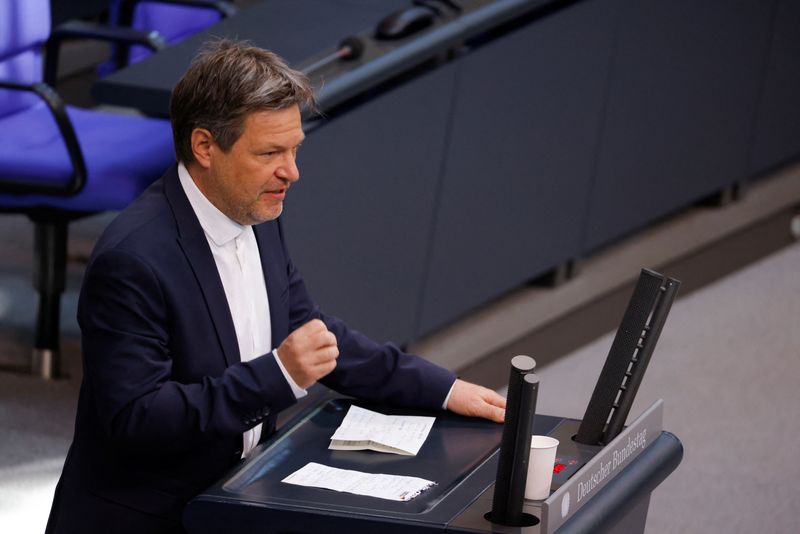BERLIN (Reuters) -Germany has made significant progress towards reducing its exposure to imports of Russian gas, oil and coal since Russia invaded Ukraine, Economy Minister Robert Habeck said on Friday.
Germany is trying to wean itself off Russian energy in the wake of the Ukraine crisis, but this is an uphill battle after decades of relying on Russia for energy supplies.
Habeck said imports of Russian oil now accounted for 25% of German imports, down from 35% before the invasion, and gas imports have been cut to 40% from 55%. Russian hard coal imports were down to 25% from 50% before the invasion.
"The first important milestones to free us from the grip of Russian imports have been achieved," he said.
By this summer, the share of Russian gas imports will fall to 24%, but he said it could take until the summer of 2024 for Europe's largest economy to no longer be reliant on Russian gas.
Habeck said achieving that goal would require enormous effort by the government, states, municipalities, companies and consumers. He said utilities were working hard to tackle decades of reliance on Russian pipelines.
The minister has been visiting gas producers such as Qatar and Norway in recent weeks to ask them to step up supplies for Germany.
Utilities Uniper and RWE are working on liquefied natural gas (LNG) terminals to bring sea-borne gas into the country.
The European Union and United States are set to unveil a deal to supply Europe with more U.S. liquefied natural gas (LNG), sources have told Reuters.
President Joe Biden, who attended the EU leaders summit in Brussels on Thursday, promised the United States would deliver at least 15 billion cubic metres (bcm) more LNG to Europe this year than planned before, sources familiar with the matter have said.
Germany has made the most progress in reducing its dependence on oil and coal shipments from Russia.
Habeck said German companies had been able to diversify quickly by cancelling contracts, letting them expire, or striking new ones with alternative parties.
Germany could halve its dependency on Russian oil by the summer and this could be cut entirely by year-end.

Power generation plants burning Russian coal could go without Russian supplies as early as the autumn of 2022.
Habeck said while it was too early for an immediate energy embargo, already "every supply contract that is ended will damage Putin."